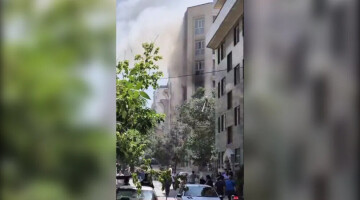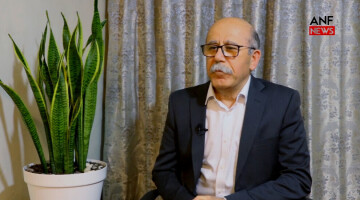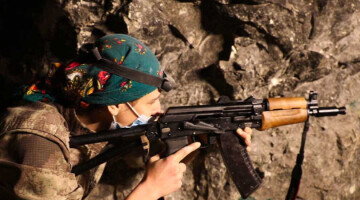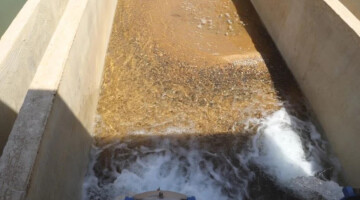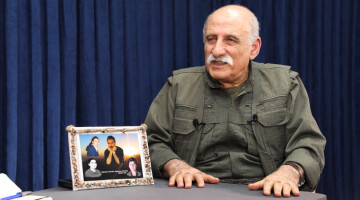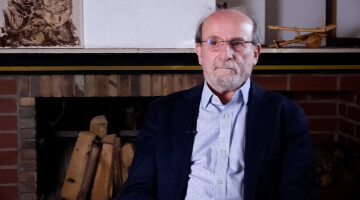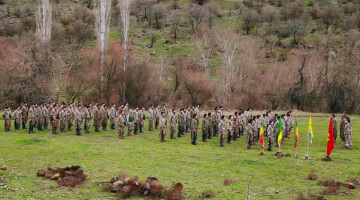Over the past few weeks, with the poisoning of a Russian agent in England, the arrows have turned to Russia. Following this, international coalition forces in Syria, which are in a crucial position in the world and Middle East crisis, have moved. This movement opened a new phase in the Third World War.
The International coalition forces again hit Syria. In the wake of America's announcement that it will withdrawn forces from the region, France has become the new military force in Manbij. Britain said it would intervene in the crisis with a tougher language than the United States.
ANF spoke with KCK Executive Council Member Riza Altun about this new phase in the Third World War, the role of the international coalition forces, Russia-Turkey, Russia-Iran, Russia-Syria relations, elections in Iraq and Turkey elections and the possible consequences.
- After the US-UK-France attacks on Syria on 14 April, the Third World War and the Middle East crisis entered a new phase. After these air raids, there has been a change in the actors of the region. Alongside the UN, we find in the international coalition a more active France and Britain a low-level Germany and Italy, and Saudi Arabia at regional level. How did this new process develop and what would emerge from this new equation?
We cannot separate the last air raids against Syria from the general world politics. This situation is linked to the international coalition and its relationship with Russia or rather the US-Russia relation. There is a crisis being experienced here. They tried to show that this crisis is connected to the crisis of the poisoned Russian agent in Britain. But in reality this is nothing but the expression of the international crisis. I remember when the Soviet Union collapsed and the world stopped to be divided into two blocks. This was the assumption: no more eastern and western block division. But the emergence of Russia proved that there will always be a block with a defined character.
In short, there will be a dominant force in the world and the system led by the United States will always be the resistance against it. It is true that Russia came out a bit weird when it first emerged. Then world politics took the stage again. The world system led by the US didn’t give up being a block itself despite proclaiming to be against block systems. There was always conflict among the forces trying to become hegemony.
Likewise there were always crises in Russia. For this reason, there was no a strong hegemony emerging. But this contradiction has always emerged. It went through different stages and emerged again in the Syrian crisis.
Of course, in the Syrian crisis, this situation should be evaluated in the context of the Middle East reality. It would be better to treat the living crisis as a general situation within Capitalist modernity. But there are regional characters. While America is leading the way in shaping the world on the basis of the new world order, it is not leading the way in the shaping of the Middle East. And so it wanted to have the support of the many decisive forces in the world, taking the regional states with it, or anticipating regime changes. There was no alternative. In the past, Russia was not very active. It was worried with the problems and relationships with its own neighbours. Later it turned to Syria. Russia, entered in Syria. Its intervention is important. If Russia had limited its intervention in Syria, the contradiction would have been manageable within certain limits. But by not keeping these contradictions within certain boundaries, the dream of a new hegemonic structure in the Middle East emerged. If one tried to make Syria the center of it, then it would create a policy in which contradictions would actually be more intense. In fact, capitalist modernity has to see two extremes in the war of hegemony within itself. One is the stance of the United States and its allies. The other is Russia's alternative position. This is the result of the recent Russian agent crisis in Europe and the subsequent blocks formation.
The Middle East has also entered a different phase. If we pay attention to the policies of Russia in the Middle East, the final impacts are better understood. Although it is said that the Syrian regime has used chemical weapons in Eastern Guta, this actually covers the whole crisis. It is not about the massacre by the regime. It is not even the question of how many chemical weapons it used. What the regime has done in the seven-year long war is clear. Villagers were bombed, massacred. There were allegations and proofs of repeated use of chemical weapons. But such a reaction was not seen. Only some warnings were made. No intervention was done. Why is it now being debated whether or not chemical weapons were used in Eastern Ghouta? Clearly that's not the point.
-What is the main reason then of the international coalition action against the regime?
For a long time Russia has begun to carry out the politics of establishing a hegemony at regional level in Syria using the opportunities provided to it by the regime. Russia has been working on relations not just with the Syrian regime, but also with Iran and its allies, Hezbollah, and more recently with Turkey.
While the Western block has been seeking a certain change in Syria in order to reaffirm its control, the politics of Russia here is the opposite.
Just as importantly, as I said earlier, are Turkey's relations with Russia. This relation is at a breaking point.
Turkey has an important position. Since its foundation as a nation state it has relations with the West, relations with America.
- What is the nature of this relation?
Turkey began to increasingly internationalized relations with Russia. This is economic, military relations and agreements. But most important of all of them is actually taking its chance to intervene in the Middle East. The opportunity to Turkey was given by Russia that gave the green light to the occupation of Afrin.
This is a very critical point. Russia is using Turkey, and if necessary can give green light to other places like it did with Afrin. The renewed Turkish arrogance is actually the result of Russia's policies: it is using the Turkey format to attack America and the international forces. Turkey’s hostility against Kurds has been taken as a new political situation. The international coalition cannot accept this new situation. If it does, it will lose its effectiveness in the Middle East, with losing its control around the world put in the second plan, or else it will say to stop this.
- Will the international coalition actually say to stop this?
There are signs of this. That's what the agent crisis in England is all about. The message was given around the world that sanctions would be issued.
-What will happen next?
There are two points to make here. First, how Russia will improve relations after this message. Second, Turkey relation with Russia: which turn this relationship will take. According to this, there will be a new situation. On the other hand, after having taken this stance, the coalition is now repositioning itself. This is also a new situation. To sum up: after the 14 April strikes, both fronts - the international coalition forces and the Russian - feel that something is happening.
- Some analysts say that the Kurds have made a great political move in Afrin? What do you think?
First of all: defeating DAESH in Kobanê was a turning point. With the liberation of Raqqa it has become clear that DAESH has lost its old strength. Let’s abstract all this. There is a big crisis in the Middle East, the capitalist modernity, the nation state crisis of the Middle East. This, of course, is a crisis in economic, political, cultural and social sense.
Forces such as DAESH and al-Nusra were put into action run the crisis of modernity in the Middle East for three to five years. Rojava and YPG and then SDF forces exposed this. Because, to a great extent, these jihadist forces have been defeated, they lost power, but the crisis is still unresolved. The curtain on the top was removed, but the crisis remained. Then the crisis has to express itself with new forces. Which is when the states have begun to show their powers, given that the forces they had used so far, DAESH and al-Nusra - are no longer powerful enough. This happened after Raqqa, both in the context of international powers and in the context of regional nation states.
-So how is this crisis going to develop or be resolved from now on?
From now on, the crisis will either continue with conflict on the basis of international relations and regional powers' relations and contradictions, or there will be an attempt to solve it. Now the possibilities of resolving the crisis in Syria have emerged. But this is not just about Syria. It's about the Middle East and the world system. Solving the issue in Syria will not be meaningful without solving the problem in the Middle East. In fact, resolving the issue in Syria without solving the Middle East problems can actually cause a much bigger crisis.
Today, when we look at the situation of the United States-led and the Russia blocks can see that there is definitely a potential solution. Unfortunately though at the moment no one is trying to solve the issue. They are heading towards a politics that makes Syria more clashing and chaotic.
Today, when the international coalition forces hit the Syrian regime they are actually hitting the regime's allies as well.
Up to now this relationship-contradiction dynamic would actually manifest itself in the diplomatic arena. But now one side has actually hit the other one.

